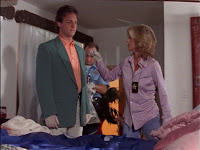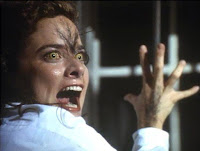No, it can’t be all three. Think about it. Don’t go for the bear suit with your snarky comments.
Anyway…
I talked about the detective’s speech a few weeks back, and I thought it’d be worth mentioning a big way it can go wrong.
I can even give an example. The one I hinted at then…
So, I’ve mentioned once or thrice that I worked on a detective show for a few years. It wasn’t a very good one, mostly because no one ever seemed really sure if it was a detective show or a cop show or maybe some kind of late-night-cable-sexy show. And it really didn’t help that all of it got pressed through this sort of ‘80s filter… in the late ‘90s.
Anyway, one episode reached into the fifth act with our heroes backed into a corner. They had nothing. None of their clues led anywhere. None of the motives held up. Everyone’s alibi checked out. It really seemed like one of those cases where the bad guy—whoever they were—was going to get away with it.
Then they went back to talk one of the people they’d interviewed earlier and explained how they remembered something he’d said. Which led to them examining his bank records last night. Which led to talking to one of his business partners. Which led to them getting a warrant this morning and searching his house. During which they remembered his love of European architecture and found the priest hole in his home office. Where they found the murder weapon this morning… with his prints on it.
Bam! Case closed. Another one for the good guys.
Except… even as we filmed it, the cast and half the crew sensed something was wrong here. It felt weird. And not just because of some horrible editing (that came later).
Except… even as we filmed it, the cast and half the crew sensed something was wrong here. It felt weird. And not just because of some horrible editing (that came later).
Our entire mystery was solved off-camera. Almost nothing we’d seen for the entire episode was relevant. In the end, we just had the two leads standing there giving the detective’s speech about a bunch of deductions and discoveries that all happened off-camera. The audience didn’t see any of it. They were told about solving the mystery rather than being… well, shown it.
Which is a real killer in a visual medium. And not terribly great in print, either. It’s easier to get away with, yeah, but still not a habit I want to get into.
When this happens, I think it’s because writers feel like they’re following Elmore Leonard’s famous rule of thumb about skipping stuff nobody’s going to want to read. Or not going to want to read twice. In the case above, we don’t want to see the detectives find all the clues, and then also watch them talk about how they found all the clues.
So the question is, which one do I cut?
On one level, this is another empathy thing. Most of the time, it’s going to come down to dramatic impact. What’s going to give my reader a bigger kick in the gut—seeing them find the gun, or seeing them stand in a parking lot and tell someone they found the gun?
On another level, this is just knowing what my plot is. On a detective show (even a late-night-cable-sexy one), the plot is about solving the mystery. Sure, confronting and catching the bad guy is great, but it’s also… well, kinda incidental. Solving the mystery inherently means we’ve caught the bad guy. We want to know it happened, but that’s not what we picked up the mystery novel for.
Y’see, Timmy, 99% of the time, plot happens in front of my audience. I can fade to black for a sex scene, maybe skip over the hero’s six hour shift at the grocery store, maybe not even show the bad guy getting confronted and arrested —but those things aren’t really plot, are they? They’re elements we drop into the story for extra flavor.
As I mentioned above, Elmore Leonard said to cut out all the parts people skip anyway. But I shouldn’t be cutting out the stuff they picked up my book to see. If I remove a scene and nothing really changes, it probably isn’t plot. If I remove a scene, but then need to add another scene where they talk about what happened in the now-missing scene… well, that scene was probably plot.
I want to see the plot unfold.
So do my readers.
So do my readers.
Next time… I’d like to talk about origin stories.
Until then, go write.








